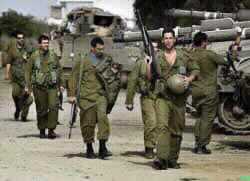- Author:
& News Agencies - Section:
WORLD HEADLINES
Israel Raids Refugee Camp

Israeli occupation tanks and occupation troops swept into a refugee camp in the West Bank Tuesday after a Palestinian resistance man shot dead five Israelis, including two children in their beds, in an attack on a kibbutz. Sunday's kibbutz killings and the raid in Tulkarm refugee camp could complicate a U.S. peace mission that began Monday.
Witnesses and security sources said about 30 Israeli occupation tanks, armored occupation troop carriers and jeeps raided the camp around 3 a.m. and swept through the streets.
They said two Palestinians had been arrested amid heavy gunfire but there were no injuries. The occupation troops withdrew to the outskirts after several hours but imposed a curfew on Tulkarm city close to the "Green Line" diving Israel and the West Bank.
Israeli security sources said Israel decided on military action in the Tulkarm and Nablus areas of the West Bank because they were suspected of links to Sunday night's assault on Kibbutz Metzer, a collective farm community inside Israel.
In the village of Shweike, north of Tulkarm, Israeli occupation troops demolished the house of Mohammed Naifeh, described as a senior activist from the armed wing of Palestinian President Yasser Arafat's Fatah movement. The occupation army said Naifeh was responsible for Sunday's attack.
The Palestinian Authority condemned the latest occupation army action.
"The Israeli military escalation is very grave and it will lead to negative consequences. The American administration should press toward finding a political solution," said Nabil Abu Rdainah, a senior aide to Arafat.
In the latest violence, a two-year-old Palestinian boy was shot dead in his father's arms in Rafah refugee camp in the Gaza Strip Monday night, medics said.
Palestinian witnesses said the gunfire came from an Israeli occupation army watchtower and that the shooting was unprovoked, but an occupation army spokesman said occupation troops had responded to shots fired at them.
RARE ATTACK ON KIBBUTZ
resistance men have been waging an uprising against Israeli occupation in the West Bank and Gaza Strip since September, 2000. But the attack on Kibbutz Metzer was a rare raid on an Israeli collective farm.
Security sources said Israel had opted for military action in Nablus, from which the gunman was believed to have come, as well as Tulkarm, the Palestinian city closest to the kibbutz.
The resistance man burst into a house, shooting dead a 34-year-old mother in the doorway of her children's room and killing her sons aged four and five as they cowered under their blankets.
The al-Aqsa Martyrs Brigades, an armed offshoot of Fatah, said it carried out the attack to avenge Israel's killing of an Islamic resistance man commander and vowed "more martyrdom attacks until occupation leaves our land."
Arafat's Palestinian Authority has been unable to persuade resistance men spearheading the uprising not to attack civilians inside Israel, as opposed to occupation troops and Jewish settlers on West Bank and Gaza lands where Palestinians want a state.
It expressed "strong condemnation of the killing of civilians" but said it was carried out while a "brutal war machine" was killing Palestinian men, women and children.
Hopes for a halt to resistance bombings in the uprising were renewed after Palestinian officials said the Islamic resistance group Hamas had discussed a possible one-year suspension of such attacks during talks with Fatah in Cairo Monday.
But the new violence clouded U.S. envoy David Satterfield's visit to push a new peace "roadmap" entailing reciprocal steps by the two sides -- mainly Palestinian reforms and Israeli occupation army withdrawals -- leading to a Palestinian state in 2005.
The proposal, part of efforts by a "Quartet" of U.S., European Union , U.N. and Russian mediators, has met with skepticism from Palestinian officials and Israeli ministers.
Most in the region believe the roadmap will lead nowhere, at least until after Israel's general election on January 28 and after a resolution to the crisis over Iraq now preoccupying President Bush.
At least 1,655 Palestinians and 631 Israelis have been killed since the Palestinian revolt erupted after U.S.-brokered talks on Palestinian statehood stalled.
PHOTO CAPTION
Israeli occupation troops return to their base outside the West Bank town of Tulkarm on November 12, 2002. Israeli occupation tanks and occupation troops swept into the refugee camp in Tulkarm following the previous day's attack by a Palestinian resistance man who shot dead five Israelis, including two children in their beds, in a left wing kibbutz. (Damir Sagolj/


 Home
Home Discover Islam
Discover Islam Quran Recitations
Quran Recitations Lectures
Lectures
 Fatwa
Fatwa Articles
Articles Fiqh
Fiqh E-Books
E-Books Boys & Girls
Boys & Girls  Women
Women









